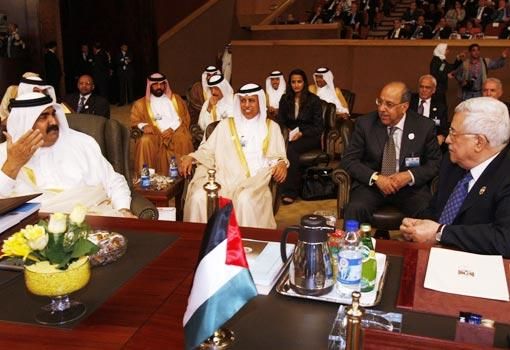Damascus: Syria on Saturday emphasised its firm stand towards peace with Israel and called on Arabs to look into ways to reactivate the peace initiative launched in Beirut in 2002.
Syrian President Bashar Al Assad, who yesterday assumed chairmanship of the 20th Arab Summit in Damascus without the protocol handover from Saudi Arabia, said that peace could only be achieved after the return of the entire Golan Heights to the June 4, 1967 borders.
"Israel's continuous incursion will never bring them better conditions and will never make us accept giving up an inch of our land or any of our rights," he said.
The leaders of 11 Arab countries did not attend the two-day summit with Lebanon boycotting the meeting because of what it says is Syria's role in blocking the election of a new Lebanese president. Lebanon blamed Syria for inciting the opposition to reject any reconciliation plan including the Arab initiative endorsed by the Arab League early this year.
Frustration
Bashar denied any involvement in Lebanon's internal politics and expressed the Syrian government's concerns about the internal division in Lebanon which he said was the reason behind blocking an agreement on national common denominators.
He insisted that Syria believes the solution is in the hands of the Lebanese themselves. The seat earmarked for Lebanon itself was left vacant, but Syria trumpeted the absence of US allies as a triumph over Washington's influence.
"They [the US] did their best to prevent the summit but they failed," Syrian Foreign Minister Walid Mua'alem told reporters ahead of the two-day gathering.
"Their aim is to divide the Arab world."
Several Arab officials have expressed frustration at the West's "interference" in Arab affairs.
"There has been US pressure on Arab countries to reduce their participation," Libyan Foreign Minister Abdul Rahman Shalgham told reporters in Damascus yesterday.
"We as Arabs do not interfere in European summits. It has become a farce and this situation must be remedied by a joint Arab effort."
Egypt sent a junior minister, while Saudi Arabia and Jordan were represented by their ambassadors to the Arab League.
"There will be no trace of the United States on the summit's work or agenda," Mua'alem told his counterparts on Thursday in a preparatory meeting for the summit.
Lebanon has been without a president since the end of November and has been mired in political crisis for more than a year because of feuding between the Western-backed parliamentary majority and the Hezbollah-led opposition, backed by Syria and Iran.
In Beirut, Lebanese university students tore up portraits of Bashar and branded him an "assassin." Hundreds took part in the protest near the Beirut tomb of former premier Rafik Hariri, assassinated in a 2005 car bombing widely blamed on Syria, which has denied involvement.
At the opening of the summit, Arab League chief Amr Mousa stressed regional stability depended on a solution to the Lebanese crisis.
"The election of a Lebanese president ... and the friendship between the two neighbouring and brotherly countries, Syria and Lebanon, are essential for the return of calm and stability to our region."
- With additional inputs from agencies













